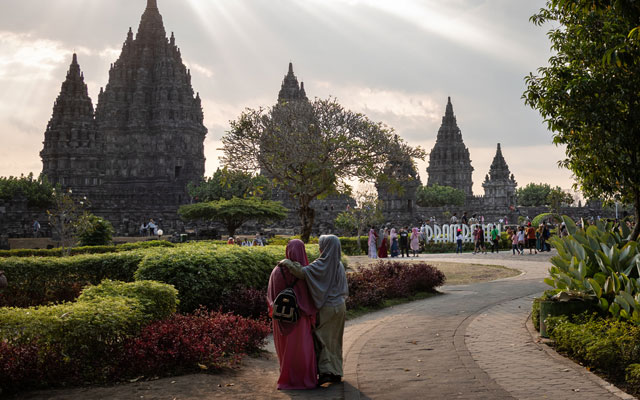Setting its sights to revive tourism to the country, Indonesia has put in place a slew of initiatives to capture a greater slice of the post-pandemic Muslim travel market.
Speaking at the panel discussion titled Strengthening the Quality of Indonesian Tourism through Halal Lifestyle, held in conjunction with the recent Halal in Travel Global Summit, Riyanto Sofyan, chairman of the Indonesia Halal Tourism Association (IHTA), said that among its strategies to lure Muslim travellers to Indonesia is to strengthen the destinations’ offerings to meet changing demands.

Riyanto said: “We are launching new and unique travel products, focusing on nature-based, wellness and cultural offerings, such as (developing new) glamping resorts and community-based tourism villages.”
One of the products in the making is the Syariah Quadrathlon initiated by the Syariah Economic Society Indonesia, which will include endurance horse-riding, swimming, running and archery.
Otto Setiawan, executive director of Syariah Quadrathlon Indonesia 2021, said the event will initially target domestic participants, with the aim to attract travellers from neighbouring countries at a later stage.
Rizki Handayani, deputy of tourism product and MICE at MoTCE, said: “(One of the post-pandemic trends) is travelling in small group sizes. We hope the domestic destinations can come up with new attractions that meet the needs of specific market segments, sports tourism being one of them.”
She also advised travel agencies on the importance of creating experiential value for tours. “You need to incorporate a story-telling component into the tour. Invite the young generations in your destinations to create stories about their places,” Rizki said.
Riyanto said IHTA would also emphasise on capacity building and the implementation of the Cleanliness, Health, Safety and Environmental Sustainability Plus (CHSE+) protocols at tourist destinations.
Wisnu Rahtomo, deputy chairman at IHTA, explained: “The Ministry of Tourism and Creative Economy has come up with the CHSE standard and the InDOnesia CARE (I Do Care) Campaign and we are supporting the initiative by adding the halal travel values to the standard (with the creation of CHSE Plus protocols and the I Do Care Plus campaign).”
In the aspect of Cleanliness, for example, the added component includes Muslim-friendly toilet and prayer amenities, while the Health element in restaurants is to provide halal-certified food and beverages.
“These are basic requirements but many have not paid much attention to them,” Wisnu said.
He added that the I Do Care Plus pilot project is planned for four regencies in West Java where a team comprising the regional government, academicians and practitioners would assist accommodations, restaurants and attractions in implementing the CHSE Plus standard.
Yenike Purbandari, a leader at the Nepal van Java tourism village, Butuh Village in Temanggung, Central Java, opined that the I Do Care Plus programme should not only focus on educating the industry but also the travelling public.
“As management, we implement the protocols and request visitors to wear masks but there is a misconception among travellers that when they are travelling outdoors, they do not need to wear a mask,” she said.
She also appealed for the government to address the manpower crunch in the sector, especially in tourism villages which are rapidly gaining popularity.




















